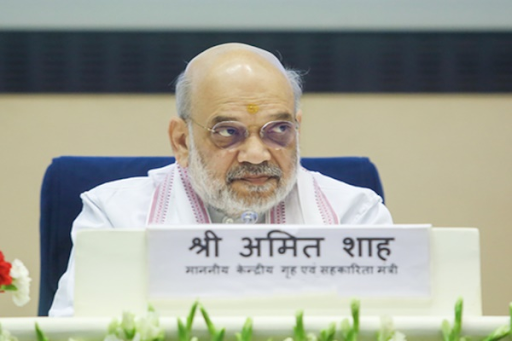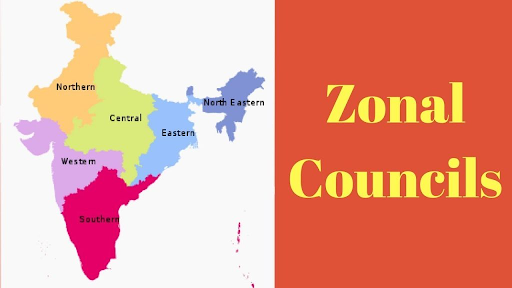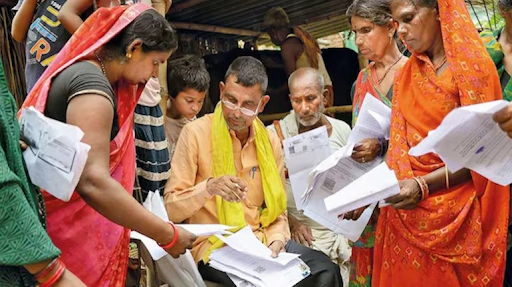



Zonal Councils, created under the 1956 Act, promote cooperative federalism by resolving inter-state disputes, coordinating security and supporting regional development. Their impact remains limited by irregular meetings and weak follow-up. Strengthening them through regular reviews and better implementation, as recommended by major commissions, can improve cooperation.

Copyright infringement not intended
Picture Courtesy: NEWSONAIR
The Northern Zonal Council meeting on November 17, 2025, in Faridabad, Haryana, chaired by the Union Home Minister.
Zonal Councils are high-level advisory bodies that strengthen federal structure by promoting cooperation, dialogue, dispute resolution, and coordinating development and security among states, UTs, and the Union Government.
Legal Status: Zonal Councils are statutory bodies, established under Part III of the States Reorganisation Act, 1956.

Composition and Structure of Zonal Councils
The Five Zonal Councils and their Members
|
Zonal Council |
Member States / UTs |
|
Northern Zonal Council |
Haryana, Himachal Pradesh, Punjab, Rajasthan, NCT of Delhi, and UTs of Chandigarh, Jammu & Kashmir, and Ladakh. |
|
Central Zonal Council |
Chhattisgarh, Uttarakhand, Uttar Pradesh, and Madhya Pradesh. |
|
Eastern Zonal Council |
Bihar, Jharkhand, Odisha, and West Bengal. |
|
Western Zonal Council |
Goa, Gujarat, Maharashtra, and UT of Dadra & Nagar Haveli and Daman & Diu. |
|
Southern Zonal Council |
Andhra Pradesh, Telangana, Karnataka, Kerala, Tamil Nadu, and UT of Puducherry. |
Facilitating Dialogue and Consensus
Serves as a platform for discussion and recommendation on shared concerns like economic and social planning, border disputes, linguistic minorities, and inter-state transport.
Acts as a "safety valve" for resolving issues and mitigating friction between states and between the Centre and the states.
Harmonizing Policies
Works to align state policies on national matters, including internal security, disaster management, and the execution of key national initiatives like Direct Benefit Transfer (DBT).
Addressing National Priorities
Recent agendas including urgent national concerns, such as accelerating investigations into sexual offenses, broadening access to rural banking, and enhancing healthcare provision through schemes like Ayushman Bharat.
Role in Conflict Resolution and Security
Inter-State Water Disputes: The Satluj-Yamuna Link (SYL) Canal dispute between Punjab and Haryana is discussed at the Northern Zonal Council.
Combating Left-Wing Extremism (LWE): Eastern Zonal Council's regular intelligence sharing and joint operations have resulted in 76% decline in LWE violence since 2010. (Source: Union Home Minister)
Advisory Nature: Recommendations are not legally binding, making their implementation dependent on the political will of the Centre and states.
Irregular Meetings: While historically irregular, meetings have increased between 2014 and 2024, with 63 meetings of the councils and their standing committees held. (Source: PIB).
Implementation Gap: A lack of a robust mechanism to monitor the implementation of decisions leads to a gap between resolutions and on-ground action.
Overshadowed by Other Bodies: The role of Zonal Councils is sometimes overshadowed by constitutional bodies with greater authority, like the GST Council.
|
Commission |
Key Recommendations |
|
Sarkaria Commission (1983) |
Advocated for reactivating Zonal Councils, urging more regular meetings and serious consideration of their advice to promote cooperative federalism. |
|
M.M. Punchhi Commission (2007) |
Zonal Councils should meet at least twice yearly for better inter-state coordination, with the Inter-State Council secretariat aiding Zonal Council follow-up. |
Zonal Councils are essential components of federal structure, strengthening cooperative federalism and providing a non-partisan platform for dialogue.
Recent increases in meeting frequency suggest a renewed effort to enhance their effectiveness. To realize their full potential:
Sustained political will from both the central government and the states is required to transform these councils into potent instruments for national integration and balanced regional development.
Source: NEWSONAIR
|
PRACTICE QUESTION Q. What are Zonal Councils? Critically examine their role in promoting cooperative federalism in India. 150 words |
Zonal Councils are high-level advisory bodies created to promote cooperation among states and between the Centre and states. They are statutory bodies, established by the States Reorganisation Act of 1956, and not constitutional bodies.
The Union Home Minister is the common Chairman for all five Zonal Councils (Northern, Central, Eastern, Western, and Southern). The Chief Ministers of the member states act as Vice-Chairmen on a rotational basis.
Their effectiveness can be enhanced by implementing the recommendations of the Sarkaria and Punchhi Commissions, which suggest holding meetings more regularly (at least twice a year) and establishing a robust institutional mechanism to monitor the implementation of their recommendations.



© 2026 iasgyan. All right reserved